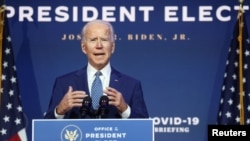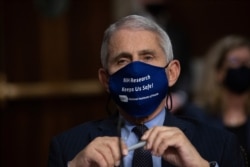As coronavirus infections surge in the U.S., infectious disease health experts said Sunday that President Donald Trump’s refusal to concede his reelection loss to Democrat Joe Biden has kept them from handing off key information to the incoming Biden officials to help curb the pandemic.
One of Biden’s COVID-19 advisers, Dr. Atul Gawande, told ABC’s “This Week” show, "It is in the nation's interest that the transition team get the threat assessments ... understand the vaccine distribution plans, you need to know where the stockpiles are, what status is of masks and gloves."
He added, "There's a lot of information that needs to be transmitted. It can't wait to the last minute."
Trump has refused to concede his defeat while he pursues long-shot legal claims that the November 3 vote was rigged against him and he has blocked his administration from cooperating with Biden’s transition team throughout government agencies.
The country’s top infectious disease expert. Dr. Anthony Fauci, a fixture on Trump’s coronavirus task force, told CNN, "Of course it would be better if we could start working with them.”
Fauci, the director of the National Institute of Allergy and Infectious Diseases, said he has been through political transitions involving six presidencies.
Fauci said, “It’s very clear that the transition process that we go through ... is really important in a smooth handing over of the information.”
“It's almost like passing the baton in a race,” he said. “You don't want to stop and then give it to somebody; you want to essentially keep going."
In recent days, the U.S. has recorded as many as 184,000 new coronavirus cases in one day, according to Johns Hopkins University, with surging counts in numerous states across the country. More than 245,000 Americans have died from COVID-19 and more than 10.9 million infected, with both figures more than in any other country.
Trump’s handling of the coronavirus outbreak in the U.S. was one of the key issues in the election, with national polls showing that voters trusted Biden more than Trump to deal with the pandemic.
Fauci and another coronavirus official, Admiral Brett Giroir of the U.S. Public Health Service Commissioned Corps, both said that it has been "several months" since Trump met with the White House coronavirus task force, which is headed by Vice President Mike Pence.
Fauci said that with the expected approval of a coronavirus vaccine expected in the coming weeks, he thinks the U.S. could start getting back to "relative normal" by April or July next year.
Drugmaker Pfizer announced last week that tests of its vaccine show it is more than 90% effective.
Trump said Friday that at least 20 million vaccine doses could be ready as early as December, with an additional 25 million to 30 million doses available in each subsequent month.
"That's great,” Fauci said, “but we have to get people to take the vaccine.
"So, if we get the overwhelming majority of people taking the vaccine, and you have on the one hand an effective vaccine, on the other hand, a high degree of uptake of the vaccine, we could start getting things back to relative normal as we get into the second and third quarter of (2021), where people can start thinking about doing things that were too dangerous just months ago," Fauci said.
Giroir called news of the possible eventual success of the Pfizer vaccine a "game changer," but that the surge in the number of new cases still leaves the country in a critical situation and the lack of a transition from the Trump administration to Biden’s troubling.
"I want to be as transparent as possible with everybody; this is not a political issue," he said. "This is an issue of public health and saving American lives. And I think there's nothing more important than that."







